Kirkus Reviews, founded in 1933, is a venerable institution in the media world. For more than 75 years, Kirkus has served as the industry bible for bookstore buyers, librarians, and ordinary readers alike. Now Popdose is proud to announce our partnership with this titan of American publishing.
We’ve joined the Kirkus Book Bloggers Network. Every week, a rotating crew of your favorite Popdose writers will grace the virtual pages of Kirkus Reviews Online, taking on the best — and sometimes the worst — in pop-culture and celebrity books. From coffee-table studies to quickie unauthorized bios, if it’s about show biz, it’s fair game.
This week we’ve got something very special — in fact, we can say with no exaggeration that it’s downright godlike…
Thor, the latest Marvel superhero movie, opened this weekend. Although Thor debuted nearly half-a-century ago, and the character is a key part of the Marvel Universe, he hasn’t quite got the name recognition of Spider-Man or Captain America. Created in 1962 by writer Stan Lee and artist Jack Kirby — although perhaps ”interpreted” is a better word than ”created,” since the character and much of his supporting cast are drawn from Norse mythology — Thor present newcomers with a baffling bulk of backstory, with dozens of volumes of collected material to choose from, both in trade paperback and hardcover. Here follows a highly idiosyncratic Top Ten list of favorite Thor moments, to serve as a guide for the curious reader.
Words of Advice for Young People. While keeping the focus squarely on feats of derring-do, Thor’s creative team would occasionally slow the action to deliver a point about the human condition. As a legendary god operating in the world of mortals, Thor’s unique status makes him a perfect philosophical mouthpiece. In this sequence from mid-1960s, Thor asks the assistance of three counterculture-types:
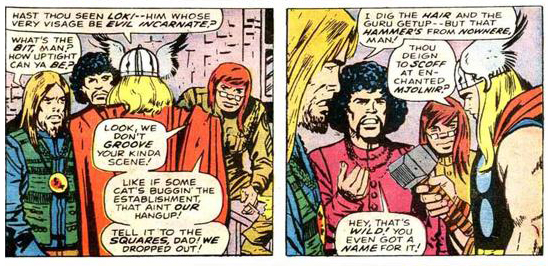
Thor is saddened by their passivity, and upbraids them in no uncertain terms:
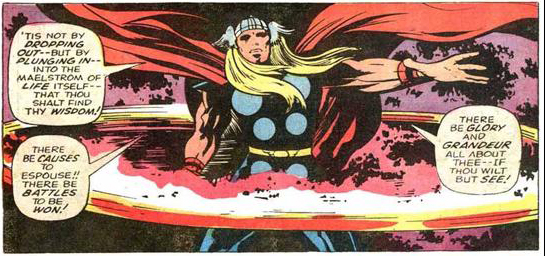
”When life doth seem too much to bear, tis not the time to renounce the struggle,” he continues. ”The ostrich hides — the jackal flees — but man — and god — do persevere!”
On one level, it’s corny — two middle-age fellows giving a stern talking-to to Those Crazy Kids These Days. But consider that Jack Kirby spent his twenties kicking Hitler’s ass in Europe, doing his bit to save the world from Nazi tyranny. Are you going to tell him that it’s best to hold yourself aloof from the battles of life? (Images from Thor #154: collected in Marvel Masterworks: The Mighty Thor, Volume 7)
Immortality Ain’t All It’s Cracked Up to Be. The story ”To Become an Immortal” is perhaps Thor’s finest cocktail of epic action and humanist homily. The setup: Thor is forbidden to marry his mortal girlfriend Jane Foster. He appeals to his father Odin, King of the Gods, and Odin agrees to make Jane a goddess so the two can be wed. Thor whisks Jane away to Asgard, home of the gods, where Odin gives her a godly makeover:
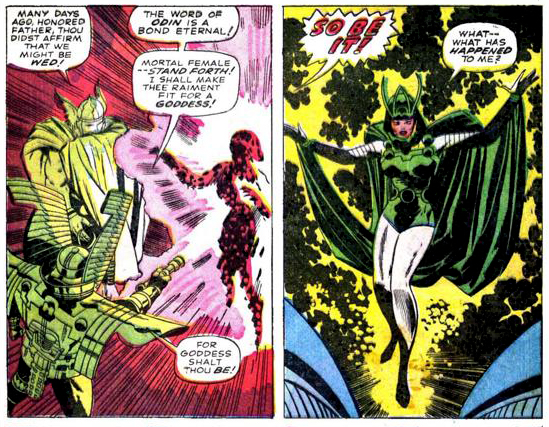
But Jane, confronted by sights no mortal eye was ever meant to see, starts freaking out. And when, to complete her initiation, Jane must face down a creature called the Unknown (real subtle, guys), things get worse:
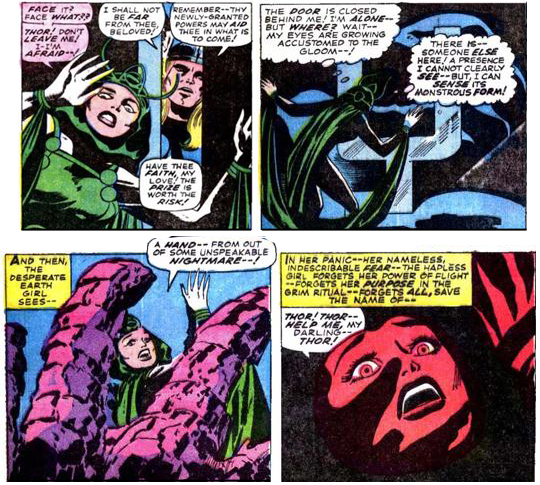
For her inability to confront the Unknown without fear, Jane is disqualified from goddess-hood, and it all ends in tears. As a metaphor for reconciling daydreams of a thing long wished-for with the reality thereof, it’s pretty big and obvious — but effective, nonetheless. (images from Thor #136: collected in Marvel Masterworks: The Mighty Thor, Volume 5)
Hopping Mad. In 1983, writer/artist Walt Simonson took over the book. An innovative draftsman and storyteller, as well as a scholar of both Norse legend and Marvel Universe backstory, Simonson’s run on the book mined classic folk-tale and fantasy tropes for grandeur. But those sources also inform a keen sense of the absurd — never moreso than when the Prince of Asgard finds himself magically turned into a bullfrog. The transformed Thor falls in with a frog colony in Central Park, and helps them in their struggle against marauding rats — for even trapped in an amphibious form, the Prince of Asgard is still a warrior born:
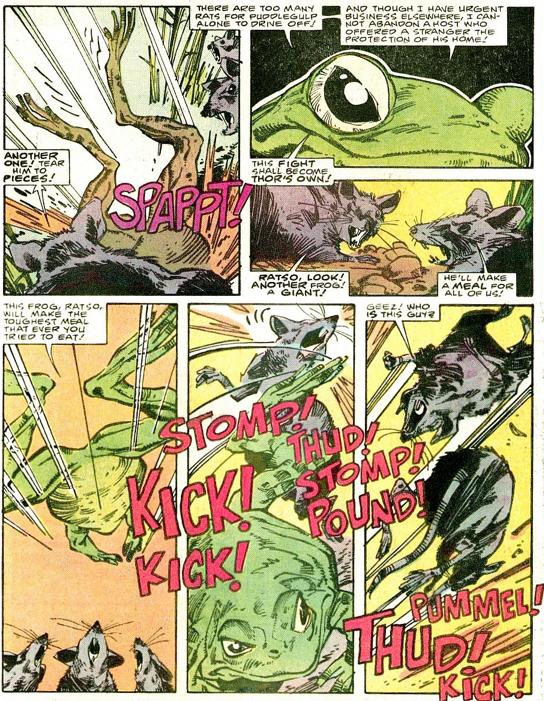
But the true, glorious madness begins when our transformed hero stumbles across his discarded hammer, and, after a mighty struggle, manages to lift it, and… well, remember that bit about ”Whosoever holds this hammer”?
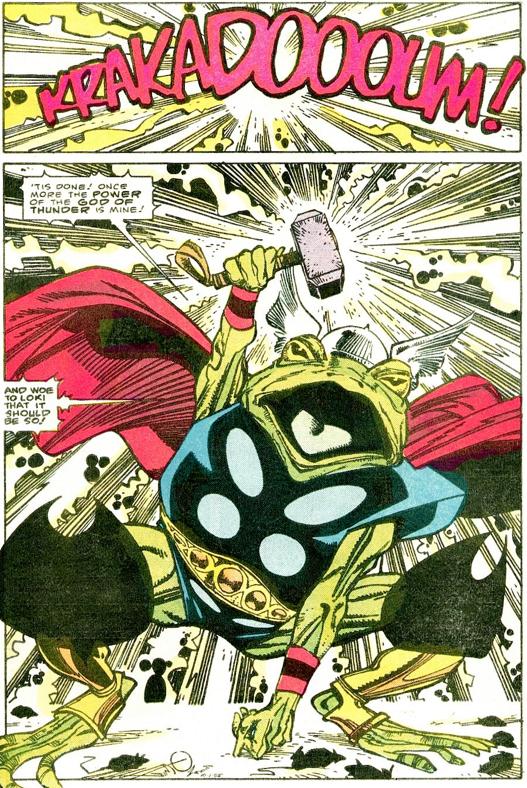
That’s our hero, kids — a six-foot-six, thunder-wielding man-frog. No wonder my generation is all screwed up. (From Thor #364 and #365: collected in Thor Visionaries: Walter Simonson, Volume 3)
Valhalla, I Am Coming! In a way, 2008’s ”Ancient Asgard” stories bring Thor full circle. Matt Fraction’s scripts evoke the tone, if not the content, of the old legends. The gods squabble and snipe and are made stupid with lust and drink. Their Asgard, as rendered by artists Patrick Zircher and Khari Evans, is not a golden city of sci-fi spires but a dingy mead-hall where they wait out the endless northern winter. And when the action kicks in, well…
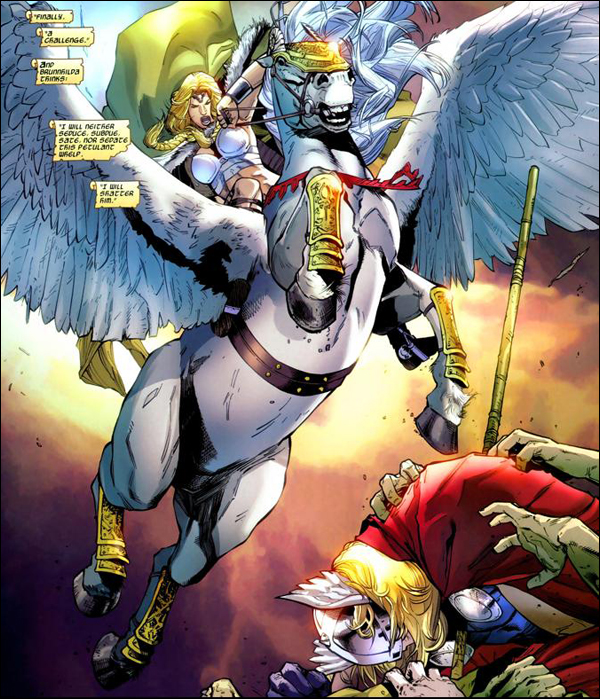
These are the gods before they grew into their latter-day nobility, rough deities for a rough culture. This is heavy metal comics, as funny, raunchy, and brutal as the myths that inspired it — ancient and modern all at once. (Image from Thor: Man of War one-shot: collected in Thor: Ages of Thunder)
…And David Caruso as Fandral the Dashing. Thor projects usually avoid pop-culture pastiche — the property is, by its very nature, an ill fit for that sort of riffing — but the 2009 one-shot The Trial of Thor, by writer Peter Milligan and artist Cary Nord, is pure Hollywood high concept. The action takes place in the realm of the gods, where Odin has asked the Warriors Three the investigate a string of killings that appear to be the handiwork of the Thunder God himself. Along the way, they interview eyewitnesses, and even call upon expert testimony — in a scene eerily similar to a certain TV franchise:
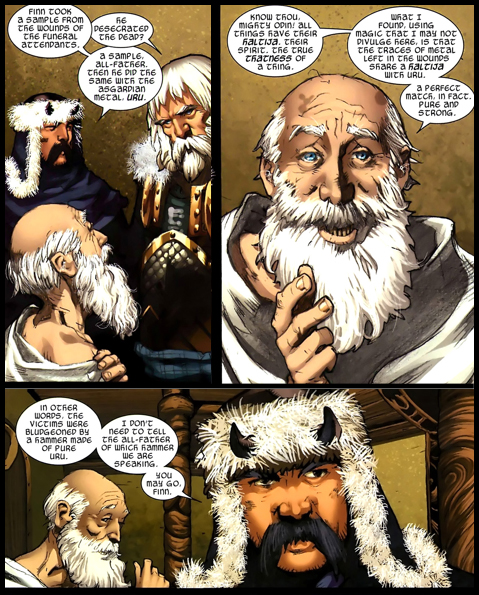
Yup, it’s CSI: Asgard! While it may not be a story for the ages, The Trial of Thor makes the list for its sheer brazenness and high spirits. Yeeeeeahhh!
Forsooth! Thou canst readeth the remainder at Kirkus Reviews — get thee hence!




Comments